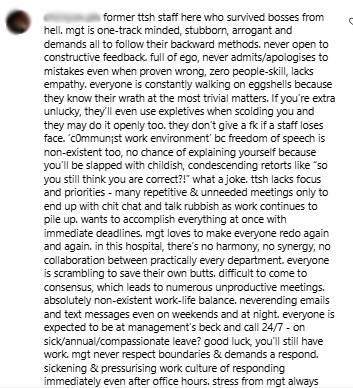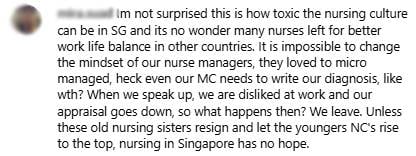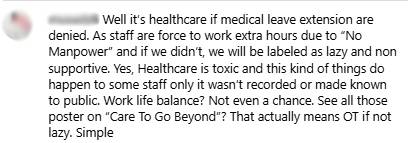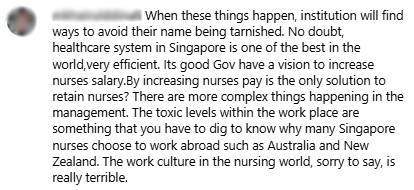SINGAPORE: The sudden death of a 34-year-old healthcare worker at Tan Tock Seng Hospital (TTSH) has reignited concerns over burnout and toxic work conditions plaguing Singapore’s healthcare sector.
On 26 January, Red Dot United Secretary-General Ravi Philemon posted on Facebook that a resident had informed him about the tragic case.
According to the resident, the healthcare worker, who had joined the profession through Singapore’s Professional Conversion Programme (PCP), collapsed in the operating theatre due to fatigue.
She was granted three days of medical leave and allegedly requested an extension due to continued illness. However, that request was denied, and she passed away shortly after returning to work.
Philemon highlighted that this reluctance reflected a larger systemic issue.
“We owe it to those who dedicate their lives to caring for us to ensure they are not overburdened or put at risk themselves,” he said, calling for reforms to prevent overwork and burnout in high-pressure professions.
TTSH’s Response and Dispute Over Facts
Philemon contacted TTSH on 13 January to verify the claims and was assured by the hospital’s CEO that the matter would be investigated.
On 22 January, TTSH confirmed certain details, including that the worker had collapsed while on duty, was treated, and was given medical leave. However, the hospital stated that some details shared with Philemon were inaccurate.
In a 31 January Facebook post, TTSH accused Philemon of misrepresenting the situation and criticised him for publicising the issue without the family’s permission.
Philemon responded the same day, arguing that TTSH had validated key aspects of his post but failed to clarify what details were inaccurate.
He also pointed out that the hospital had not addressed whether the worker had requested an extension of medical leave or if it had been denied.
“Had they at least pointed out to me the parts of my post that were inaccurate, I would have gladly made the necessary changes,” he said.
Philemon has since renewed calls for reforms to protect healthcare workers from excessive stress and fatigue.
“The death of one healthcare worker is already one too many,” he said, urging the Ministry of Health to review staff workloads, establish anonymous reporting channels, and enhance mental health resources.
Former TTSH Employees Speak Out
Following The Online Citizen’s Instagram post on the incident, several commentators who claim to be former TTSH employees came forward to share their experiences working at the institution.
One former TTSH employee criticised the hospital’s management, describing it as “one-track minded, stubborn, and arrogant.”
The individual alleged that leadership demanded compliance with outdated methods, dismissed constructive feedback, and lacked empathy.
According to the user, employees often worked in a stressful environment, walking on eggshells to avoid management’s wrath over trivial matters.
They further described TTSH’s workplace culture as rigid and oppressive, likening it to a “communist work environment” where freedom of speech was non-existent.
Work-life balance was also reportedly poor, with staff expected to be available 24/7, including on weekends and during sick or compassionate leave.

Another ex-employee shared a troubling account of workplace abuse, stating that after reporting a colleague’s violent behaviour and verbal harassment to human resources (HR), no action was taken.
The individual described their experience at TTSH as “daily mental torture.”

Meanwhile, another former staff member acknowledged the dedication of hospital staff but highlighted a strong hierarchical structure, noting that upper management held absolute authority.
Even when employees attempted to speak up, their opinions were often dismissed or met with scrutiny

Toxic Work Environment in Healthcare
Echoing these concerns, many other healthcare workers shared their frustrations about the overall working culture in the sector.
One user expressed dissatisfaction with Singapore’s nursing profession, stating that many nurses have left for better work-life balance overseas.
They claimed that nurse managers tend to micromanage, even requiring medical certificates (MCs) to include a diagnosis.
Speaking up against such practices, they alleged, leads to workplace disapproval and lower appraisals, ultimately driving nurses to resign.
They argued that unless senior nursing leaders step down and allow younger nurse clinicians to take charge, the profession in Singapore has little hope for improvement.

Another healthcare worker highlighted the emotional toll of the job, stating that despite their best efforts, healthcare workers often feel unappreciated.

A different user shared that in their previous organisation, nursing leaders discouraged taking medical leave, insisting that staff with body pain should take painkillers and report to work.
They were even required to call their supervisors before seeing a doctor to justify their visit.

Excessive workload was also a major concern. One commenter stated that staff were regularly forced to work extra hours due to manpower shortages, and those who refused were labelled as lazy or unsupportive.
“Work-life balance? Not even a chance,” they remarked, claiming that slogans promoting care and commitment to the profession were, in reality, veiled expectations for overtime work.

Calls for Urgent Reforms
While Singapore’s healthcare system is renowned for its efficiency, systemic issues in hospital management are reportedly prompting local nurses to seek opportunities abroad, particularly in countries like Australia and New Zealand, for better work-life balance.
One commenter suggested that while increasing nurses’ salaries is a step in the right direction, deeper structural problems within management must be addressed to truly retain talent.

With mounting testimonies from healthcare workers and systemic issues left unaddressed, the tragic death of this healthcare worker serves as yet another wake-up call for urgent reform.
The post TTSH healthcare worker’s sudden death sparks concerns over toxic work culture appeared first on The Online Citizen.


